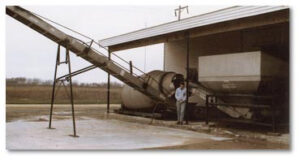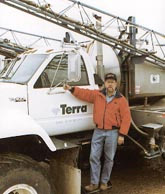 Keeping the Delta Green
Keeping the Delta Green
Dumas, Arkansas, U.S.A.
Terra International, Inc., with home offices in Sioux City, Iowa, operates the largest farm center network in North America. It offers farmers one-stop shopping for their crop input needs — fertilizer, pesticides, and seed. At last count, Terra’s distribution network consisted of more than 425 farm service centers and a network of about 840 affiliated dealers. These locations are concentrated in the midwestern and southern regions of the United States, and the eastern region of Canada.
Terra serves growers’ fertilizer needs directly with nitrogen in the form of anhydrous ammonia, nitrogen solutions, and urea, as well as supplying phosphate and potash. Terra also offers a full range of services to the grower. These include soil sampling, soil analysis, crop input recommendations, custom applications, crop scouting, tissue analysis, yield checks, crop financing, new product and agronomic practice updates, and assistance with precision agriculture.
David Aiken is the general manager of Terra’s store in Dumas, Arkansas, a town of approximately 6,000 people located about a 2 hour drive south from the state capital of Little Rock. David is also responsible for a nearby satellite operation in Gould, Arkansas. The two stores employ 11 people on a full-time basis with another 5 – 6 people being taken on during the busy season from the middle of March through August.
As one of Terra’s 300 Certified Crop Consultants, David has first-hand experience with his customers’ crop input needs. “The area we serve is located at the junction of the Mississippi and the Arkansas rivers and is heavily agricultural,” says David. “Local growers raise a lot of rice and cotton and soybeans and are big users of our products. We emphasize farm delivery — growers very seldom come into town to pick up their supplies.”
During the busy season, the stores operate 16 hours a day, seven days a week. Last year, David’s stores moved 3,300,000 lbs. of liquid fertilizer and an additional 20,520,000 lbs. of dry fertilizer. “Since fertilizer tends to be so corrosive, this kind of volume represents a real test of our equipment,” says David.
 Protecting their bearings
Protecting their bearings
The fertilizer business requires a heavy investment in specialized equipment. According to David, his stores operate ten 1,000 gallon nurse tanks for their liquid fertilizer and eight knifing applicators used to side-dress nitrogen on cotton and corn. “When it comes to our dry equipment, the list is pretty extensive,” say David. “We have twenty 5 ton dry fertilizer carts, four 15 ton augur trucks, two 20 ton delivery tenders, two custom applicator trucks, and two 20 ton Killabrew trucks which are self-contained motorized units that we dolly down to the farm.”
David’s big concern are his bearings. “We’ve got 243 axle bearings that run on the ground. We just can’t afford any downtime in our busy season so we try to keep all our bearings well-greased and in tip-top condition.” In 1992, David’s operation was using approximately 155 tubes of conventional grease on their equipment. “After seeing a Power Up demonstration, I decided to give their Thixogrease a one year trial. I actually took a bit of flak from head office when they saw I was buying a more expensive grease. However, at the end of the trial period, our usage had dropped from 155 tubes down to around 60 tubes. Not only that, but our bearings were operating real well.” In fact, in the five years since David has been using Thixogrease on his equipment, only 6 bearings have failed. According to David, he didn’t have to be sold on the product. “I believe in letting a product prove its own worth — if it’s a good product, it will sell itself.”
Avoiding downtime is crucial to David’s management of his stores’ operations but it’s difficult to attach a dollars and cents figure to the peace of mind that comes from knowing your equipment will not fail when you need it most. David, does, however, keep detailed records on his repair and maintenance costs. “This year we are down almost $7,000 on repair and maintenance charges with a further $3,000 reduction in the cost of related operating supplies (replacement bearings, etc.) Those savings are really impressive!”
